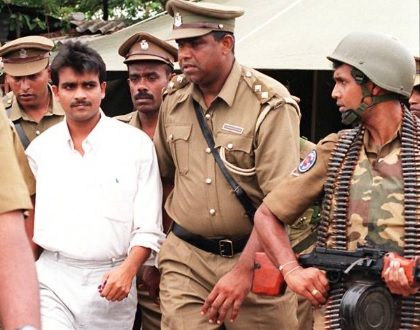Convicted soldier Somaratne Rajapakse makes new disclosures on Jaffna mass killings
COLOMBO – Lance Corporal Somaratne Rajapakse, convicted in the high-profile rape and murder of schoolgirl Krishanthi Kumaraswamy in 1996, has issued a fresh statement from death row, making new allegations about mass killings and burials in the Northern Province during the 1990s.
Rajapakse, who was identified as the principal accused in the Krishanthi Kumaraswamy case, has long been linked to the Chemmani mass grave in Jaffna. Excavations there, conducted following his testimony in 1998, uncovered 141 skeletal remains, drawing international attention to allegations of extrajudicial killings during the conflict.
In his latest disclosure, Rajapakse, while pledging that he is prepared to testify with further evidence extending beyond Chemmani, alleges that civilians arrested at checkpoints between Chemmani and the Thandikulam camp were detained in secret facilities operated by the 7th Battalion of the Sri Lanka Army. Many were tortured, and those who died, he claims, were taken to a site known as the Maniyam estate and buried there.
“I may not know the precise locations, but Maniyam estate was used for burials,” Rajapakse has said in his written statement, adding that several detention camps across Jaffna were operational in 1996 under the Security Forces Headquarters.
Rajapakse recalled that when he testified before the Colombo High Court in 1998 about Chemmani, his evidence was dismissed. “God and nature have since proven it to be true,” he said, referring to the later discovery of graves. He also alleged that following his death sentence that year, senior political figures sought to persuade him to retract his statements.
Rajapakse has said he received a letter from then Minister Jeyaraj Fernandopulle, relayed via prison officials, urging him to state that his Chemmani testimony was given “in anger.” When he refused to comply, he claims he was threatened with assault and possible assassination within prison, but survived due to the intervention of other inmates.
He also recalled a meeting in 1999 with the late lawyer Kumar Ponnambalam at Bogambara Prison, to whom he revealed details of mass killings and burials. Rajapakse alleged that Ponnambalam had promised to raise his case at the United Nations and press for his release so that he could testify. Weeks later, Ponnambalam was assassinated in Colombo.
Rajapakse also alleged that when he was later escorted to Chemmani to point out burial sites in 1999, he was instructed not to reveal all locations, with the assurance of a possible presidential pardon. “For that reason, I only revealed some of the sites,” he claimed, adding that he subsequently abandoned efforts to make further disclosures.
The soldier’s new testimony follows a letter he sent through his wife to President Anura Kumara Dissanayake in July this year, parts of which were published in our sister paper Virakesari. He insists that all the details in that letter are accurate and maintains that he remains willing to provide evidence.
Rajapakse’s fresh allegations come against the backdrop of ongoing excavations and debates on accountability surrounding wartime atrocities. Human rights groups and victims’ families have long demanded transparent investigations into mass graves such as Chemmani, as well as justice for enforced disappearances and killings in the North and East.
-ENCL



Comments are closed, but trackbacks and pingbacks are open.